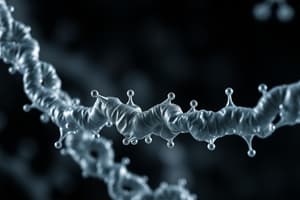Podcast
Questions and Answers
What type of bonds connect amino acid residues in proteins?
What type of bonds connect amino acid residues in proteins?
- Covalent bonds
- Hydrogen bonds
- Peptide bonds (correct)
- Ionic bonds
Which biomolecule serves as the primary energy source for most living organisms?
Which biomolecule serves as the primary energy source for most living organisms?
- Carbohydrates (correct)
- Proteins
- Nucleic acids
- Lipids
What is the main function of lipids in biological systems?
What is the main function of lipids in biological systems?
- Enzyme catalysis
- Energy storage (correct)
- Cell structure
- Immune response
Which carbohydrate plays a role in cell recognition and defense against infections?
Which carbohydrate plays a role in cell recognition and defense against infections?
In proteins, which component determines their diverse functions such as enzymes, carrier molecules, and structural components?
In proteins, which component determines their diverse functions such as enzymes, carrier molecules, and structural components?
What is the primary function of lipids in cells?
What is the primary function of lipids in cells?
Which type of lipid is involved in regulating body temperature and storing fat-soluble vitamins?
Which type of lipid is involved in regulating body temperature and storing fat-soluble vitamins?
How do lipids contribute to cell membrane structure?
How do lipids contribute to cell membrane structure?
What is a common misconception about lipids?
What is a common misconception about lipids?
Why is understanding the properties and behaviors of lipids important in the context of maintaining life?
Why is understanding the properties and behaviors of lipids important in the context of maintaining life?
Flashcards are hidden until you start studying
Study Notes
Biomolecules: Exploring Proteins, Carbohydrates, and Lipids
In the realm of biology, understanding the structure, function, and interactions of various molecules is crucial to comprehending the intricacies of life. Among these key molecules are proteins, carbohydrates, and lipids, collectively referred to as biomolecules. Let's delve deeper into each of these fascinating components and explore their roles in biological systems.
Proteins
Proteins are large macromolecules made up of amino acid residues, connected by peptide bonds. They play diverse and essential roles in organisms, serving as enzymes, structural components, carrier molecules, hormones, and immune system components. Proteins are involved in virtually every aspect of life, from metabolism to muscle contraction, and from immunity to cognition. Understanding protein structure-function relationships is critical for developing targeted therapies and diagnostics, especially in disease states.
Carbohydrates
Carbohydrates, also known as saccharides, are organic compounds composed of carbon, hydrogen, and oxygen atoms. They serve as primary energy sources for most living organisms and play essential roles in various biological processes, such as cell recognition, cell division, and defense against infections. Carbohydrates can exist in simple monomeric forms, such as glucose, or complex polymers, like cellulose.
Lipids
Lipids are another type of important biomolecules, consisting primarily of fatty acids combined with alcohols, cholesterol, or derivatives to form triacylglycerols, phospholipids, and cholesteryl esters. They serve multiple functions within cells, including providing energy storage, acting as structural membrane constituents, and participating in signaling pathways. Lipids also regulate body temperature, protect organs, and store fat-soluble vitamins.
Understanding the properties and behaviors of these biomolecules in isolation and in concert with one another helps researchers uncover fundamental principles involved in maintaining life, as well as how they fail in disease states. This knowledge fosters the development of treatments and prophylactic strategies aimed at restoring homeostasis and preventing illness.
Studying That Suits You
Use AI to generate personalized quizzes and flashcards to suit your learning preferences.




